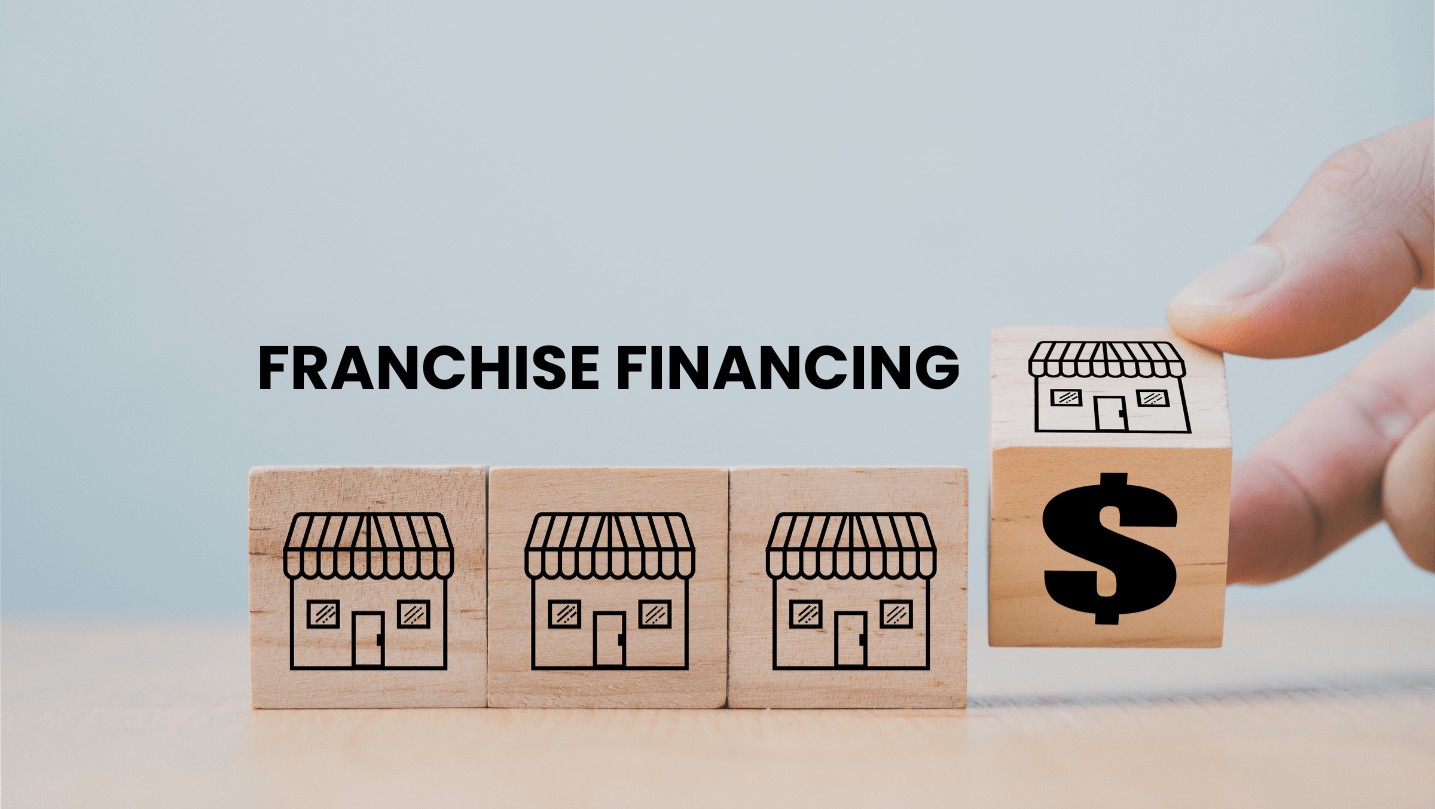Ready to Embark on an Exciting Journey with WIN?
Take the first step toward personal and financial freedom by filling out the interest form. One of our franchise advocates will be in touch with you soon!

You have always dreamed of running your own business but find yourself hitting the same roadblock: “How can I afford this?” For aspiring entrepreneurs like you, franchise financing can help with the upfront costs of launching your franchise and provide the crucial bridge to operate your business in the first year.
This article will help you confidently navigate your financing options and take crucial first steps toward business ownership.
Franchise financing is simply a way of obtaining funds to cover startup costs and operating costs (e.g., franchise fees, equipment, marketing costs) for the first year. Just like an auto or home loan, franchise financing allows you to spread payments over time.
The bottom line? Franchise financing can open doors that otherwise might remain closed, bringing your entrepreneurial dreams within reach.
When you’re preparing to invest in a franchise to achieve your dreams, it’s helpful to know the breakdown of expenses you’ll need to budget for.
This is the one-time payment you make to the franchisor for the right to operate under their brand and access training, support, systems, and often initial marketing. On average, this runs between $35,000 and $75,000, depending on the industry and brand. However, there are some incredible franchise business choices available with a franchise fee even below $20,000.
For location-based businesses, whether you’re renting or purchasing, real estate expenses in the first year fall in the $100,000 to $300,000 range. In contrast, a home based franchised business requires virtually no such upfront investment. Which is why, work-from-home businesses can be very attractive for entrepreneurs looking for low startup costs, higher return on investments, and fast payback.
Equipment and inventory can have a huge range from $8,000 to $150,000 or even more in initial and ongoing investments. Most residential services businesses typically fall in the lower end of that range, whereas a location-based business, such as restaurants or fitness centers will typically fall on the higher end of the range.
Do not skim on investing in marketing, because it’s the lifeblood of any business. As a best practice, marketing expenditure should be 8-12% of the gross sales of your business. Franchisors often create a marketing fund with fees ranging from 1% to 6% of gross sales. In addition, you must allocate additional spend for local marketing and promotions.
Pro tip: When researching a franchise opportunity, closely scrutinize what marketing support the franchisor will provide you in return for your marketing fund contribution.
Legal, accounting, licensing, and professional fees plus insurance, while not significant, are often overlooked. The exact amount can vary depending on business type and regulations.
Simply stated, working capital is the money you need to make sure you can pay your bills. You will need cash reserves to handle day-to-day expenses such as payroll, utilities, and unexpected costs. Location-based businesses (e.g., restaurants, retail) and those requiring upfront hiring (e.g., cleaning, fitness centers) require a much higher working capital compared to residential services businesses, where you can quickly start as a solo entrepreneur and then scale your team over time.
The total cost of starting a franchise business can vary wildly. For a retail or storefront type business, you’re looking at $100,000 to $300,000 range. While cheapest is not always the best, you can find some incredible business opportunities with a startup cost as low as $50,000.
| Category | Fitness Franchise | Senior Care Franchise | Home Inspection Franchise |
| Franchise Fee | $42,500 | $30,000 | $15,000 |
| Real Estate / Build-out | $260,000 | $15,000 | $0 |
| Equipment & Inventory | $147,000 | $5,000 | $7,500 |
| Marketing Contributions | 2% of gross sales | $2% of gross sales | 2% of gross sales |
| Professional & Insurance Costs | $3,200 | $3,500 | $4,000 |
| Working Capital | $47,000 | $50,000 | $2,500 |
| Employees Needed Upfront | 2-4 staff + trainers | 2-3 caregivers | 0 |
| Grand Opening | $17,000 | $5000 | $9,500 |
| Total Initial Investment | $458,826 – $907,607 | $57,000 – $185,000 | $36,775 – $44,500 |

Let’s dive into some of the common financing routes to see which one could fit your needs.
A traditional bank loan is one of the first options franchisees often consider. Banks typically offer competitive interest rates and structured repayment terms. To qualify, you’ll typically need a strong credit score, collateral, and a business plan.
Pros:
Cons:
The SBA loans specifically designed for small businesses, such as SBA 7(a) and SBA 504 loans, offer lower down payments and longer repayment periods. Franchise-related loans typically range from $50,000 to $5 million, with terms up to 25 years.
Pros:
Cons:
Many franchisors may offer their own financing programs or partner with preferred lenders.
Pro tip: Look for proven franchised businesses with very low startup costs. Paying less to start an attractive business is the most cost-effective and best financing option you can find.
Pros:
Cons:
Rollovers for Business Start-ups (ROBS) allow you to utilize your retirement accounts, such as a 401(k), to fund your franchise without incurring early withdrawal penalties or loan repayments. According to Guidant Financial, around 10% of franchise owners utilize ROBS to finance their businesses.
Pros:
Cons:
Alternative financing includes innovative options like crowdfunding, peer-to-peer lending, and equipment leasing.
Pros:
Cons:
» See: How to Get a Small Business Loan: Guide for Entrepreneurs

To increase your chances of success in getting approved for franchise financing, here are some practical steps you can take to position yourself as a strong candidate.
You need a business plan for yourself before you need it for anyone else! A good business plan can help you create a vision, create more positive energy, and help you navigate the knowns and the unknowns with confidence and preparation. Moreover, your business plan shows lenders you’ve thought carefully about your franchise. It should include financial projections, and how your franchise will support with training, marketing, and technology. A detailed plan demonstrates you’re well-prepared and lowers the risk for lenders.
A strong personal credit score (typically 680 or higher) significantly improves your chances of qualifying for bank financing. Some proven techniques to improve your credit score include paying down debts, making frequent payments for credit card bills, avoiding new debt, and consistently paying bills on time.
Most lenders require some collateral or a down payment as a form of security. This could include savings, property, or investments. Generally, expect to provide at least 10 to 30 percent of the total franchise cost upfront.
Lenders will want to review your financial history, tax returns, and bank statements. Having these documents organized and ready can speed up the approval process and showcase your financial responsibility.
Make sure you fully understand and can clearly articulate the costs involved with your chosen franchise. Knowing the specifics like initial fees, inventory, real estate, equipment, and marketing helps lenders feel confident that you’re realistic about financial requirements.
Pro tip: Make sure you are getting the support you expect from the franchisor for the fee they’ll be charging you. In particular, look for what sort of marketing, training, and infrastructure support you’ll receive on an ongoing basis.
Not all franchise financing options are created equal, so it’s crucial to choose the one that aligns best with your personal situation and long-term business goals. But how do you know what’s best for you? Here are a few practical guidelines to help you evaluate your options.
Look at interest rates, repayment schedules, and fees. Even a small difference in interest rates can have a significant impact over time. Ask yourself: Is the repayment timeline realistic based on your expected revenue?
Some financing options come with penalties if you pay off the loan early. If you anticipate your franchise performing well quickly, choosing a financing option without prepayment penalties might save you money in the long run.
Don’t simply opt for the financing option that’s easiest to secure. Consider the overall cost against potential long-term advantages. Lower-cost loans might come with stricter terms, while slightly higher-cost options could offer valuable flexibility.
Evaluate what additional resources or support come with the financing. Franchisor-backed financing might offer tailored advice or smoother processes, while independent lenders could offer more competitive terms but less guidance.

Franchise financing can feel complex at first, but once you’ve explored your options and have a clear sense of your budget, the next steps become a lot more manageable.
Start by calculating your total funding needs. This includes not only the franchise fee but also any costs pertaining to real estate, equipment, working capital, and a buffer for unexpected costs. Once you know your number, begin researching financing options early. Some loans take weeks or even months to process, so giving yourself a head start can prevent unnecessary delays.
Many brands offer financial frameworks or partnerships that simplify the process for new owners. For example, certain franchises in the home services space like WIN Home Inspection offer bundled training, access to vetted lenders, and a proven business model that can make launching your business less intimidating. That kind of structure can be especially helpful if this is your first time stepping into business ownership. Please fill out the interest form to know more.
Whichever route you choose, stay grounded in your goals, stay organized, and surround yourself with experienced people who can help you succeed.
Choosing the right franchisor can make a world of difference! With a sound plan and reliable support, you’ll be well on your way to owning and operating a successful franchise.